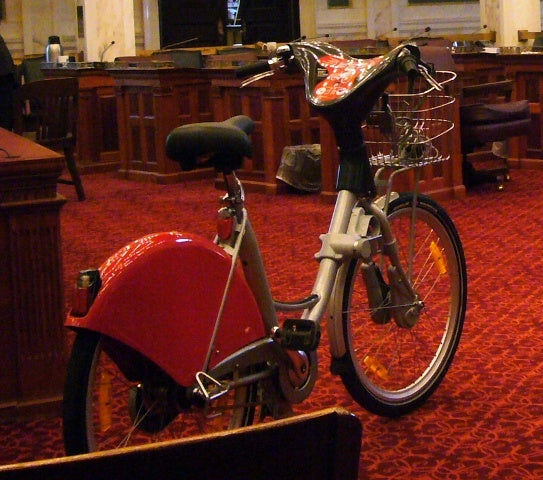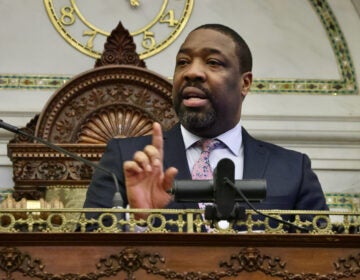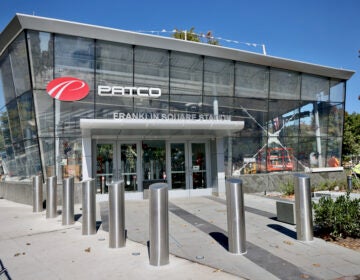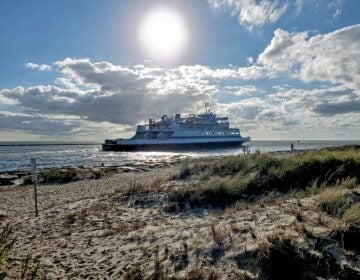Breaking news: City Council hears about bike sharing

April 30
Bike share in Washington, D.C.
Previous coverage
BikesharePhilly is asking people to email the mayor through its website at www.bikesharephilly.org/takeaction
By Kellie Patrick Gates
For PlanPhilly
The idea of residents, commuters and tourists peddling around Philadelphia on a herd of communal bicycles pleases members of City Council’s Environment, Transportation and Public Utilities committees – and that’s an important early step toward bringing a bike share program here.
But they were as skeptical as they were enthusiastic at Wednesday’s public hearing. Who would run the program? Who would be liable if there were an accident? Who would pay for it? And in exchange for a program whose costs were borne by an advertising company, would citizens be willing to accept more billboards and other advertisements?
The administration seems to share the mix of enthusiasm and trepidation.
Rina Cutler, deputy mayor for transportation and utilities, said she is supportive of bike sharing in concept. A bike share program would take cars off congested streets and their fumes out of the air, Cutler said. It would lower dependence on foreign oil, and help with the mayor’s goal of making Philadelphia the greenest city in the nation.
“However, we need additional information on how it will be structured, how it will operate, and the cost to the city,” she said.
Cutler said as of July 1, the city will have a bicycle and pedestrian planner who can help determine what kind of program would be successful in Philadelphia. She also said the city would reach out to its cyclists for input.
Many who came to speak at the hearing – some wearing bicycle lapel pins – pledged their support and willingness to help, including members of BikeShare Philadelphia, an organization formed to bring bike sharing here, State Representative Babette Josephs, the Bicycle Coalition of Greater Philadelphia and the Bicycle Club of Philadelphia.
Bike share has arrived in a growing number of cities across the world and nation. Residents, visitors and commuters can rent or borrow a bicycle to get where they are going – and drop it off near their destination. Pittsburgh has a small, recreational program. And city officials in Washington, D.C., recently announced they were starting a small pilot program that they hope will quickly grow exponentially. Cutler said Philadelphia would be watching that pilot program closely, to see if it works.
Bike share programs come in several varieties, not all of which are government run. But all require governmental support. BikeShare Philadelphia and Bicycle Coalition member Russell Meddin has estimated that the bikes and infrastructure for a full-scale program in Philadelphia would cost about $10 million, and he knows the city doesn’t have it.
But under some models, the city would pay nothing. A non-profit could run it. Or, in the most common approach, a large advertising firm pays for everything, in return for the revenue that results from running ads on bill boards and/or street furniture – things like benches, bus stops and public toilets.
Representatives from three of these companies spoke at Wednesday’s meeting. George Kauker, president of Clear Channel Outdoor’s Philadelphia division, said his company was the first to run an advertising-based bike share company. It started in Rennes, France, in 1998. And the Washington, D.C. program? That’s ClearChannel, too.
Mark Madden, from the Cemusa company, told council members that his company does not use billboards at all, just street furniture. They focus on using recyled materials, and they use solar power to illuminate their bus shelters. They run the program in Miami, and just were awarded a pilot in Rome, Italy.
Martin McDonough from Wall/Decaux brought a modern-looking, heavy street bike with him. It had a handlebar console with all types of electronics, a sleek red rear fender and a wire basket in front. His company runs the program in Lyon, as well as Paris, where every day, 100,000 users ride 20,000 bikes.
Cutler said she believes the city should start with a small pilot program. McDonough cautioned that if a program is too small, only parts of it can be tested. If there aren’t enough bicycles around the city, the bikes will not become an effective alternative means of transportation, he said.
Here’s more on how the systems work: Anyone could sign up for the bike share program, and they would be issued a swipe card, key fob, or other device that would allow them to pick up a bike at any bike station. (German programs tend to be operated by cell phone – the user sends a text to the bike share, and a text comes back with the closest bike station and a combination for the lock.) After use, users drop the bike at any other bike station in the city.
Patrons could use the bikes for a full day or more. But they usually don’t – those who want to use a bike that much tend to rent from a shop or own their own, he said.
Some programs – like Pittsburgh’s – are free. But generally there is a small charge. Still, the first 30 to 45 minutes tend to be free, and then the cost is $1 or so per hour after that. The free period encourages many, short trips by multiple users each day, Meddin said.
Most members of the public who came to speak supported bike share enthusiastically. Some shared the same concerns as council members listed.
Contact the reporter at kelliespatrick@gmail.com
WHYY is your source for fact-based, in-depth journalism and information. As a nonprofit organization, we rely on financial support from readers like you. Please give today.






